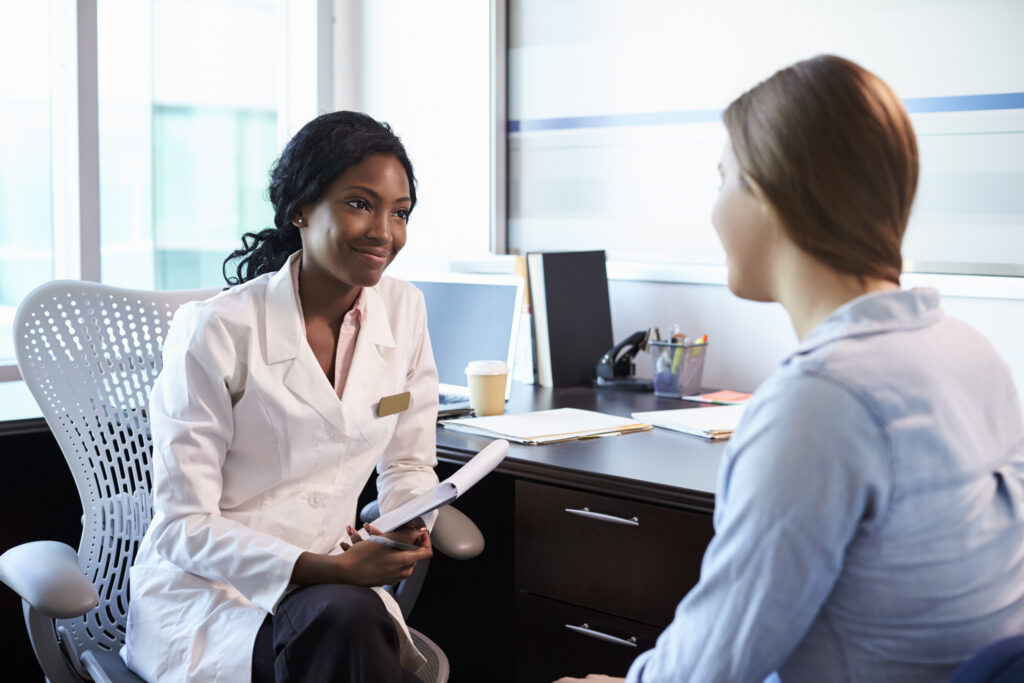Preparing for your first gynecology visit
Are you nervous about visiting the gynecologist? Visiting any new doctor for the first time can be intimidating. For many teens and young adults, the gynecologist is particularly nerve-wracking due to confusion around what an ObGyn does and fear of sharing personal information such as sexual partners and information about your period and body. We sat down with Jamie L. Benway, MD, a physician practicing at Women’s Comprehensive Health Care, to dispel myths about the gynecologist and learn the reasons why you should make an appointment and see a gynecologist or women’s health specialist for the first time.
Why do I need to visit the ObGyn?
That’s a great question. Many young people are used to visiting a family doctor or pediatrician for their primary care physician (PCP) needs. Both provide comprehensive medical exams and can screen for health conditions, so it’s understandable to want to stick to your regular PCP. However, for individuals with female reproductive organs, a gynecologist provides different but equally necessary care. You should see a gynecologist if you have female reproductive organs and:
- You are sexually active
- You have questions or concerns about any part of the female reproductive system, including the breasts, uterus, ovaries and vulva
- You have questions or concerns about your menstrual cycle, fertility or contraception
- You have huge questions or concerns about sexual health, such as libido or pain during sex
Some family medicine and ObGyn services overlap, so it’s perfectly normal to go with the provider you are most comfortable with. However, we urge you to visit the gynecologist at least once a year for critical screenings.
What age do I have my first gyno visit?
You should have your first gynecological visit between the ages of 13 and 15, per the American College of Obstetricians and Gynecologists (ACOG). That usually coincides with the early stages of puberty, when your body begins to mature and undergo many changes. Can you go earlier? Some people start their periods earlier than others and have menstrual cramps or heavier bleeding. If that is the case, you can absolutely see a gynecologist sooner than age 13.
If you are older than that and have yet to see a gynecologist for the first time, that is also OK. There is ZERO judgment if you make your first appointment at age 21, 25 or 30. We only care that you are healthy and your needs are met.
What to expect at your first gynecology appointment
You may be thinking, “What happens during a pelvic exam?” or “Do I need to see a doctor to get birth control?” No matter your reason for scheduling your first gynecology visit, knowing what to expect can make the experience easier!
First, it’s important to note that gynecologists, ObGyns and women’s health providers are professionals whose primary concern is ensuring you are safe and healthy. At Women’s Health Connecticut, we promise a judgment-free, inclusive experience, regardless of which of our 90 locations you go to. Your first appointment is an opportunity to ask questions, receive vital testing and counseling, and develop a relationship with your provider.
How to prepare for your first ObGyn appointment
You do not need to shave or use special hygiene products to prepare for your appointment. You also do not need to douche (you should never douche, it is unnecessary and may cause harm). If possible, note the date of your last period and bring a list of current medications, family medical history (i.e., do you know if you have a family history of breast or cervical cancer, etc.), and any questions you may have.
Remember, there are no “bad” questions. Your ObGyn is there to support your health journey.
What happens at the first appointment
You may be concerned that you’ll be expected to have a pap smear or pelvic exam on your first visit, but that is not always the case. You will most likely first meet with a medical assistant or nurse who will capture your vital signs, like weight, height and blood pressure.
From there, you’ll meet with your provider, who will ask questions and recommend specific tests or screenings. We will always inform you and get your consent before performing any type of exam or testing, so you have the final say. The goal is to ensure you feel comfortable and informed.
Once any exams or tests are completed, the nurse or medical assistant will inform you of the next steps, such as when to expect test results and whether or not you need a follow-up appointment.
Five reasons to see a gynecologist for the first time
You don’t need a specific reason to make your first ObGyn appointment; we are always happy to see new patients take charge of their health. However, if you are still unsure, Dr. Benway shares five reasons to see a gynecologist for the first time.
Find out if your period is normal
You may be having trouble with your periods or having hormonal issues related to your periods. Some people experience irregular bleeding, heavy bleeding, cramping, or PMS symptoms such as mood swings and bloating. We have many ways to help manage these symptoms.
Find the right birth control
New patients often come to discuss birth control options, including condoms, birth control pills, implants, injections, IUDs, and vaginal rings. Together, we’ll discuss the different options and help you decide which may be best for you.
Have screenings to make sure you’re healthy
Some people have gynecology concerns related to infections or pain. We’ll evaluate those symptoms using exams, ultrasounds, specialist referrals or labs. Then, we’ll decide which treatment options can help.
Get any problems checked out
Many people visit gynecologists for routine checkups, even when they have no specific concerns. During such visits, we may instruct you on how to perform a breast self-exam. We may also perform a pelvic exam, especially if you are sexually active. A pelvic exam typically consists of two parts: the speculum exam and the bimanual exam.
A speculum, a small duck-bill-shaped instrument, is used to allow us to see inside the vagina and the cervix. We may use the speculum to check for infections, perform a Pap smear, or investigate the causes of irregular bleeding or pain.
The bimanual exam allows us to feel your uterus and ovaries to check for cysts, masses, or other causes of pain. We perform this exam by placing one gloved finger inside the vagina while pressing gently on your abdomen.
Take a pregnancy test
Some people see us once they become pregnant. We can help guide you through pregnancy options and pregnancy care.
Talk to an ObGyn for OTC birth control needs and more
Your Women’s Health Connecticut provider is here to answer any questions you may have about your gynecological and reproductive health. While your first gynecology visit can sometimes be intimidating, know that we’re here to make you as comfortable as possible. We can even arrange a chaperone to accompany you during a visit. Contact us to request an appointment today.




